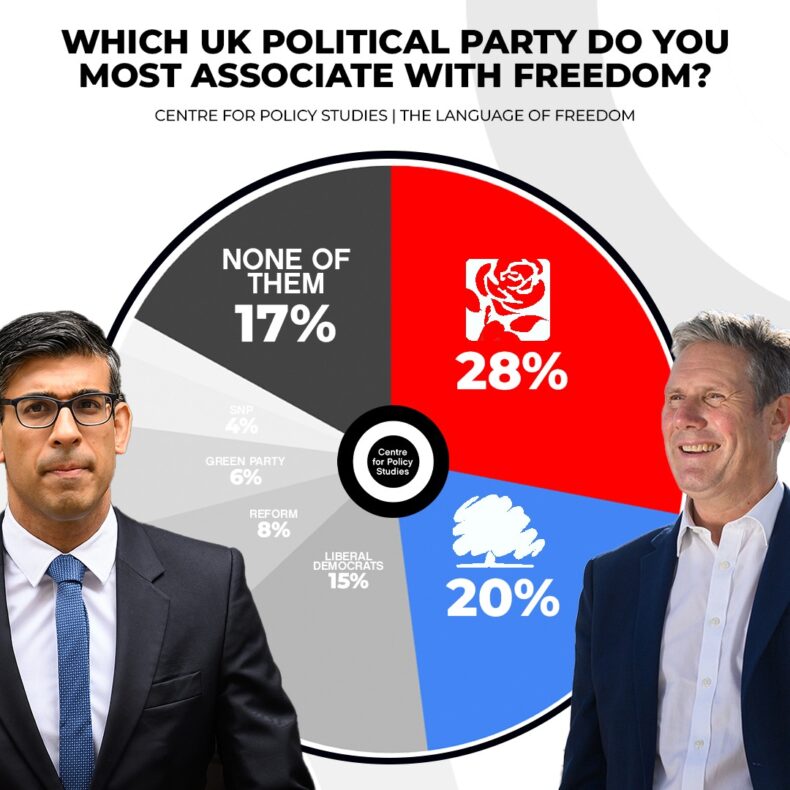When you think of freedom what comes to mind? A peaceful image of a bird flying free of its cage. Sunrise on a new day. Maybe freedom is more concrete and harder to visualise – freedom from fear, freedom to live life the way you want to, freedom to own your own home. Maybe you don’t think about freedom at all.
When it comes to political polls we usually focus on who is voting for which party and where they live. Afterall, that’s what makes the difference when it comes to forming the next government. Some polling goes deeper, drilling down into what issues or actions a party backs will appeal (or not) to voters and, if they are important enough, change their minds come election day.
But new research from world-leading pollster and communications analyst Dr Frank Luntz, conducted for the Centre for Policy Studies, breaks down the fundamental values driving British public opinion, mapping Brits attitudes to six key values: freedom, fairness, security, equality, prosperity and opportunity.
Let’s start with the good news. Britons overwhelmingly believe that Britain is a free country and many consider it the freest in the world. For a comparison, so-called ‘Land of the Free’ the USA only finishes 5th. By a margin of 73% 27%, we believe more freedom will be better for us than more government. Some 86% said freedom was very important to them personally.
Dig a little deeper though, and the cracks start to show. One-third of people feel freer today than ten years ago, a third feel less free, and a third see no change. Freedom for freedom’s sake is not a compelling narrative in the UK compared to the US and it as seen as a much more personal value. Bad news for politicians and think tank wonks who love to espouse the works of Hayek or Mill – the British public don’t think of freedom in economic or philosophical terms, it’s all about the practicalities of life.
Even when voters do come close to agreeing on the importance of an issue, what that actually means to them is very different. Conservative voters tended to feel their freedom was most at threat from crime, antisocial behaviour and migration, while Labour supporters chose politicians and government bureaucrats. Tory voters were also much more likely to trust the country’s leaders and institutions, and to believe the Government tends to give freedom (63%) rather than taking it away (37%). For Labour voters, the proportion was almost exactly the reverse.
The country as a whole wants to believe government will act as a safeguard, but while a majority (52%) believe national government should take the lead in protecting our freedoms, only 27% believe it is most likely to do so.
Perhaps most worryingly for Conservative politicians, the ones you would expect to be most keen on talking about freedom from regulation, freedom from restrictions, or freedom to live your life the way you want, more people associate the Labour Party with freedom (28%) than the Conservatives (20%).

.
There are surprises within the results too. Much as other authors on this sight may rightly rage against NIMBYism, and particularly politicians and planning departments who kowtow to opponents who shout the loudest, 71% of voters saying building homes so people have the freedom to live where they want was more important than the freedom to prevent building in your community (29%). A lesson in how to grow support for house building perhaps.
For almost every value or issue Luntz polled, there was a sharp political divide.
Conservatives feel security and freedom are the most important values. Labour voters say its fairness and equality. 32% of Conservatives said equality was least important to them personally. Labour voters say equality is the most important value for the UK’s future.
Prosperity – the thing we desperately need to grow the economy and is viewed as the most important value for the UK’s future by 23% of voters – but as the least important value by 22%.
This leaves us all with an enormous challenge – not only are the country’s priorities deeply divided, the words that most resonate are as well. Any politician or campaigner looking to convince a majority of the electorate to agree with them will have a very fine line to tread.
Click here to subscribe to our daily briefing – the best pieces from CapX and across the web.
CapX depends on the generosity of its readers. If you value what we do, please consider making a donation.


